University Emotional Intelligence Reflection: Self and Others
VerifiedAdded on 2022/10/10
|7
|1835
|296
Essay
AI Summary
This assignment is a reflective essay analyzing the student's emotional intelligence (EI) based on self-assessment and feedback from two close contacts, utilizing the Johari Window model. The student completed the Global Leadership Foundation’s Global Emotional Intelligence Test (GEIT) and Daniel Goleman’s EQ Instrument, and had two individuals complete the same tests to provide external perspectives. The essay explores the student's strengths and weaknesses in self-awareness, self-management, social awareness, and relationship management, as revealed through the Johari Window's four quadrants: open, blind, hidden, and unknown areas. The analysis highlights areas where the student's self-perception aligns with others' views and areas where discrepancies exist. The student identifies areas for improvement, particularly regarding self-esteem and expressing personal opinions more assertively, and outlines plans to enhance EI, including being more vocal and focusing on specific areas for growth. The essay references several academic sources to support its analysis of EI and the Johari Window model.
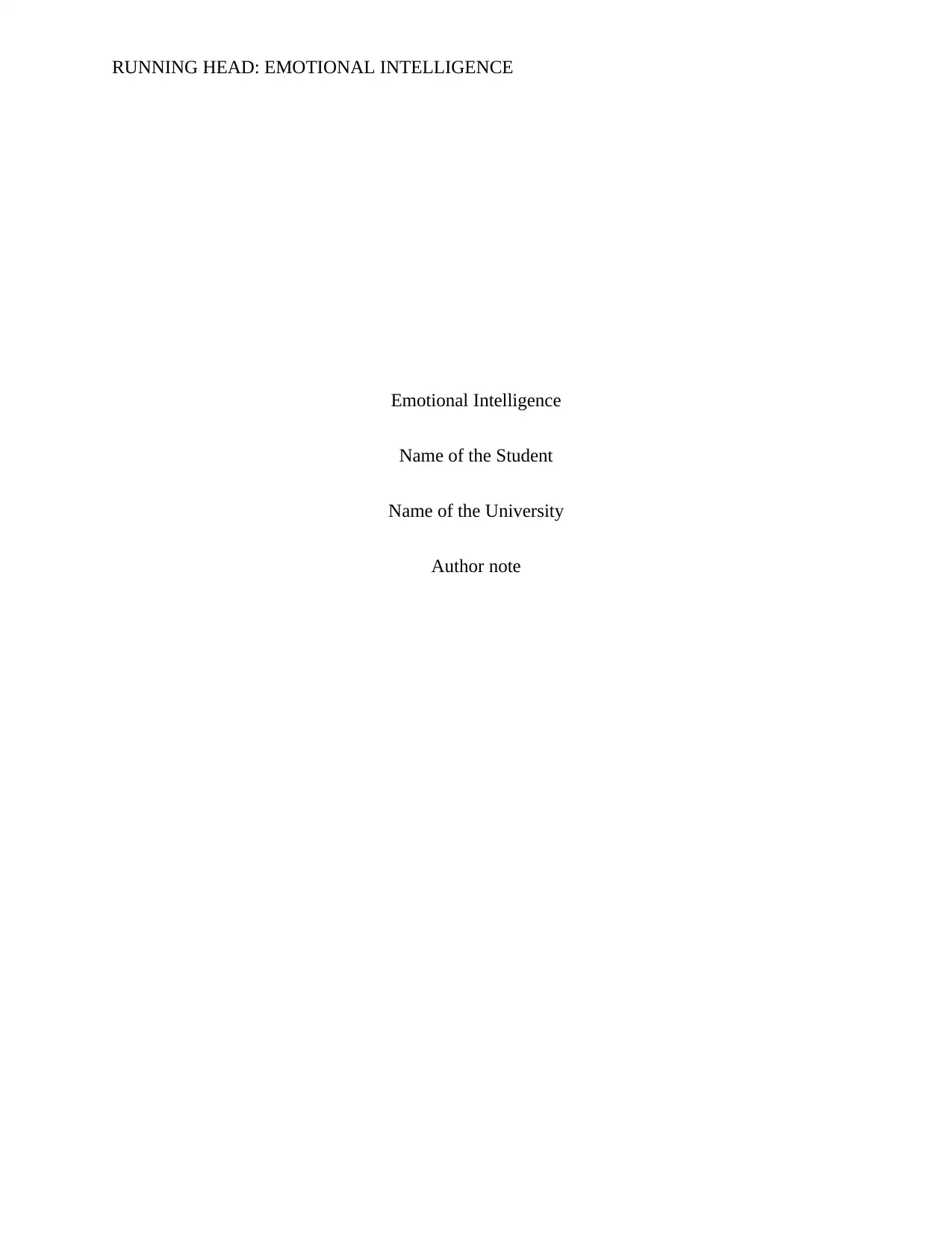
RUNNING HEAD: EMOTIONAL INTELLIGENCE
Emotional Intelligence
Name of the Student
Name of the University
Author note
Emotional Intelligence
Name of the Student
Name of the University
Author note
Paraphrase This Document
Need a fresh take? Get an instant paraphrase of this document with our AI Paraphraser
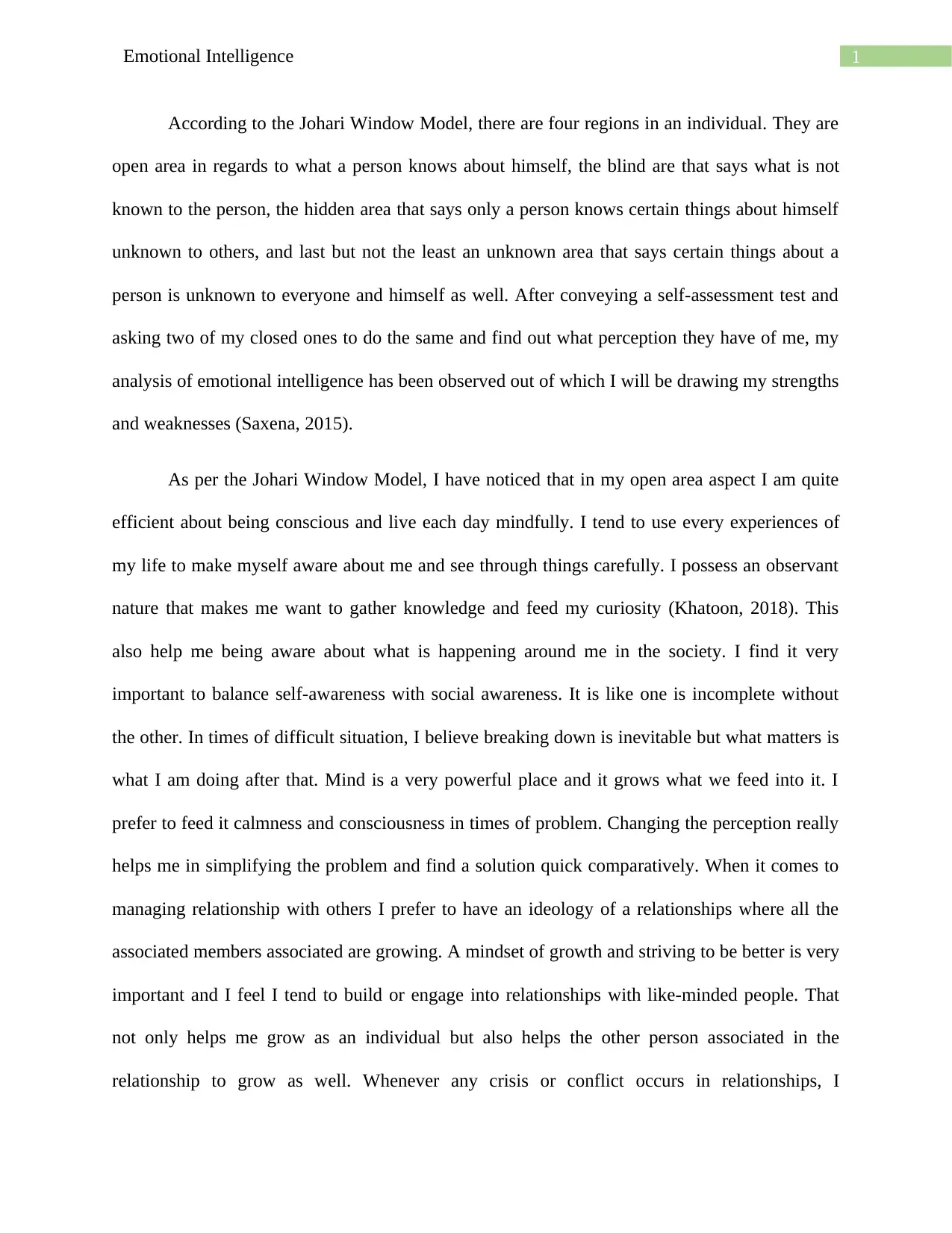
1Emotional Intelligence
According to the Johari Window Model, there are four regions in an individual. They are
open area in regards to what a person knows about himself, the blind are that says what is not
known to the person, the hidden area that says only a person knows certain things about himself
unknown to others, and last but not the least an unknown area that says certain things about a
person is unknown to everyone and himself as well. After conveying a self-assessment test and
asking two of my closed ones to do the same and find out what perception they have of me, my
analysis of emotional intelligence has been observed out of which I will be drawing my strengths
and weaknesses (Saxena, 2015).
As per the Johari Window Model, I have noticed that in my open area aspect I am quite
efficient about being conscious and live each day mindfully. I tend to use every experiences of
my life to make myself aware about me and see through things carefully. I possess an observant
nature that makes me want to gather knowledge and feed my curiosity (Khatoon, 2018). This
also help me being aware about what is happening around me in the society. I find it very
important to balance self-awareness with social awareness. It is like one is incomplete without
the other. In times of difficult situation, I believe breaking down is inevitable but what matters is
what I am doing after that. Mind is a very powerful place and it grows what we feed into it. I
prefer to feed it calmness and consciousness in times of problem. Changing the perception really
helps me in simplifying the problem and find a solution quick comparatively. When it comes to
managing relationship with others I prefer to have an ideology of a relationships where all the
associated members associated are growing. A mindset of growth and striving to be better is very
important and I feel I tend to build or engage into relationships with like-minded people. That
not only helps me grow as an individual but also helps the other person associated in the
relationship to grow as well. Whenever any crisis or conflict occurs in relationships, I
According to the Johari Window Model, there are four regions in an individual. They are
open area in regards to what a person knows about himself, the blind are that says what is not
known to the person, the hidden area that says only a person knows certain things about himself
unknown to others, and last but not the least an unknown area that says certain things about a
person is unknown to everyone and himself as well. After conveying a self-assessment test and
asking two of my closed ones to do the same and find out what perception they have of me, my
analysis of emotional intelligence has been observed out of which I will be drawing my strengths
and weaknesses (Saxena, 2015).
As per the Johari Window Model, I have noticed that in my open area aspect I am quite
efficient about being conscious and live each day mindfully. I tend to use every experiences of
my life to make myself aware about me and see through things carefully. I possess an observant
nature that makes me want to gather knowledge and feed my curiosity (Khatoon, 2018). This
also help me being aware about what is happening around me in the society. I find it very
important to balance self-awareness with social awareness. It is like one is incomplete without
the other. In times of difficult situation, I believe breaking down is inevitable but what matters is
what I am doing after that. Mind is a very powerful place and it grows what we feed into it. I
prefer to feed it calmness and consciousness in times of problem. Changing the perception really
helps me in simplifying the problem and find a solution quick comparatively. When it comes to
managing relationship with others I prefer to have an ideology of a relationships where all the
associated members associated are growing. A mindset of growth and striving to be better is very
important and I feel I tend to build or engage into relationships with like-minded people. That
not only helps me grow as an individual but also helps the other person associated in the
relationship to grow as well. Whenever any crisis or conflict occurs in relationships, I
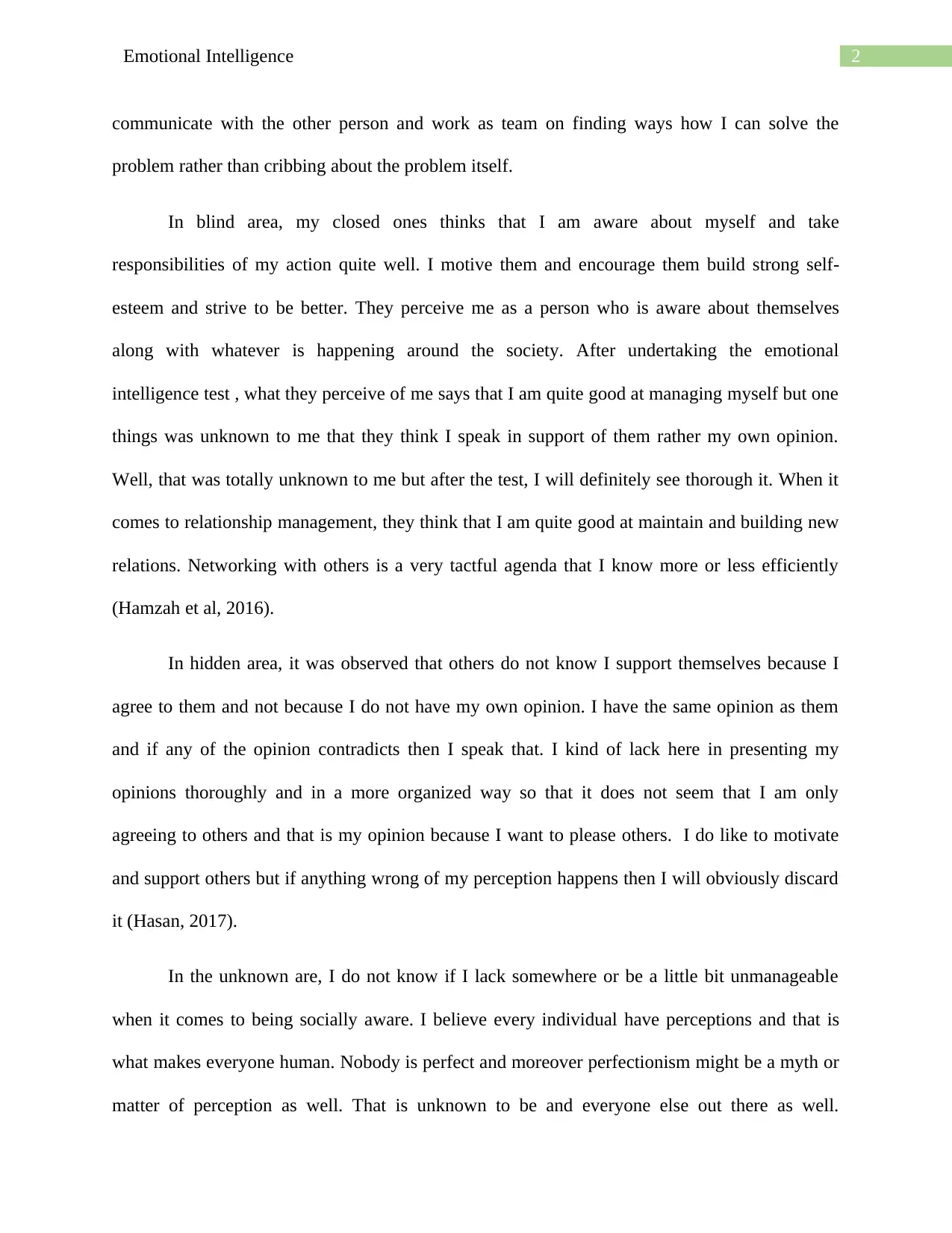
2Emotional Intelligence
communicate with the other person and work as team on finding ways how I can solve the
problem rather than cribbing about the problem itself.
In blind area, my closed ones thinks that I am aware about myself and take
responsibilities of my action quite well. I motive them and encourage them build strong self-
esteem and strive to be better. They perceive me as a person who is aware about themselves
along with whatever is happening around the society. After undertaking the emotional
intelligence test , what they perceive of me says that I am quite good at managing myself but one
things was unknown to me that they think I speak in support of them rather my own opinion.
Well, that was totally unknown to me but after the test, I will definitely see thorough it. When it
comes to relationship management, they think that I am quite good at maintain and building new
relations. Networking with others is a very tactful agenda that I know more or less efficiently
(Hamzah et al, 2016).
In hidden area, it was observed that others do not know I support themselves because I
agree to them and not because I do not have my own opinion. I have the same opinion as them
and if any of the opinion contradicts then I speak that. I kind of lack here in presenting my
opinions thoroughly and in a more organized way so that it does not seem that I am only
agreeing to others and that is my opinion because I want to please others. I do like to motivate
and support others but if anything wrong of my perception happens then I will obviously discard
it (Hasan, 2017).
In the unknown are, I do not know if I lack somewhere or be a little bit unmanageable
when it comes to being socially aware. I believe every individual have perceptions and that is
what makes everyone human. Nobody is perfect and moreover perfectionism might be a myth or
matter of perception as well. That is unknown to be and everyone else out there as well.
communicate with the other person and work as team on finding ways how I can solve the
problem rather than cribbing about the problem itself.
In blind area, my closed ones thinks that I am aware about myself and take
responsibilities of my action quite well. I motive them and encourage them build strong self-
esteem and strive to be better. They perceive me as a person who is aware about themselves
along with whatever is happening around the society. After undertaking the emotional
intelligence test , what they perceive of me says that I am quite good at managing myself but one
things was unknown to me that they think I speak in support of them rather my own opinion.
Well, that was totally unknown to me but after the test, I will definitely see thorough it. When it
comes to relationship management, they think that I am quite good at maintain and building new
relations. Networking with others is a very tactful agenda that I know more or less efficiently
(Hamzah et al, 2016).
In hidden area, it was observed that others do not know I support themselves because I
agree to them and not because I do not have my own opinion. I have the same opinion as them
and if any of the opinion contradicts then I speak that. I kind of lack here in presenting my
opinions thoroughly and in a more organized way so that it does not seem that I am only
agreeing to others and that is my opinion because I want to please others. I do like to motivate
and support others but if anything wrong of my perception happens then I will obviously discard
it (Hasan, 2017).
In the unknown are, I do not know if I lack somewhere or be a little bit unmanageable
when it comes to being socially aware. I believe every individual have perceptions and that is
what makes everyone human. Nobody is perfect and moreover perfectionism might be a myth or
matter of perception as well. That is unknown to be and everyone else out there as well.
⊘ This is a preview!⊘
Do you want full access?
Subscribe today to unlock all pages.

Trusted by 1+ million students worldwide
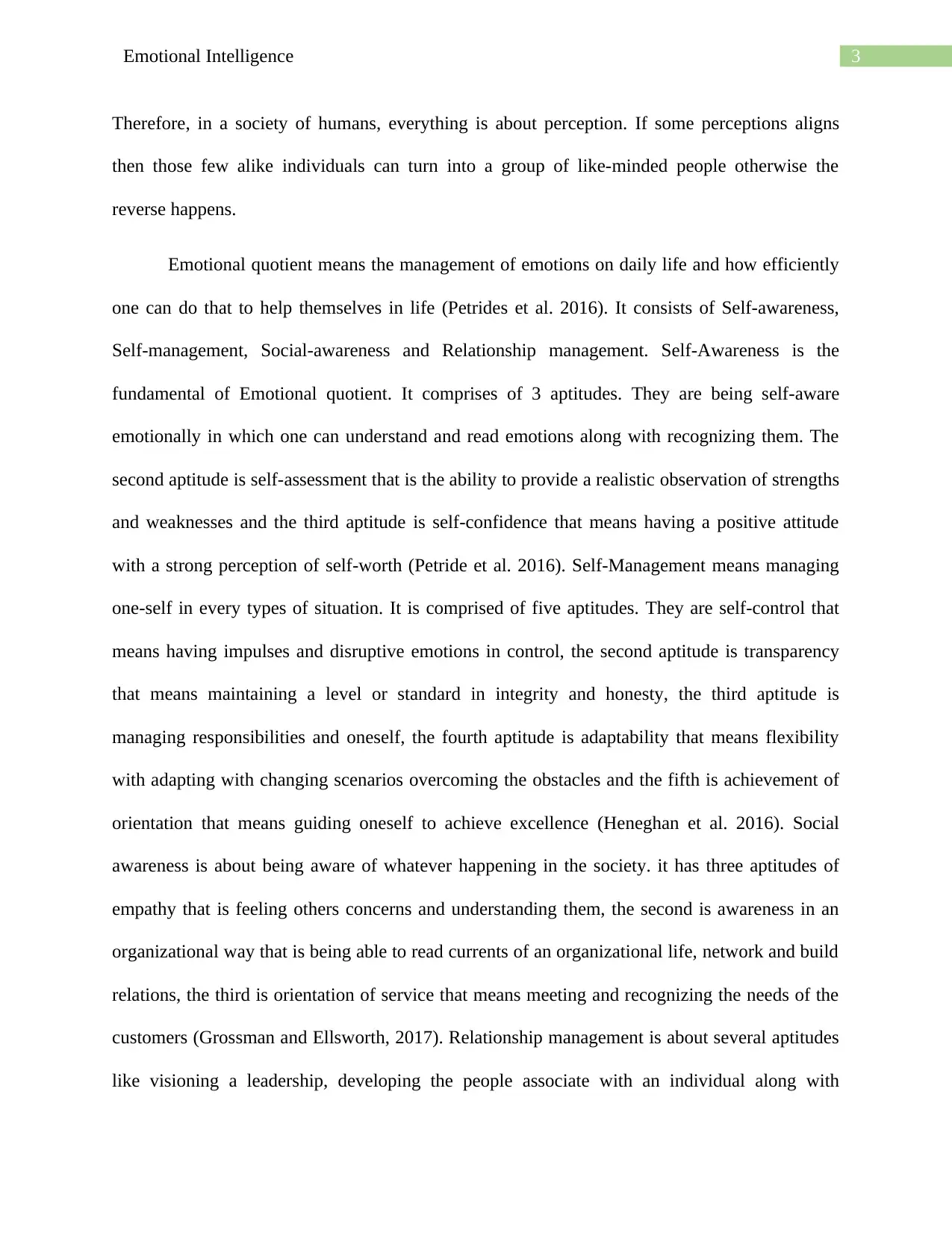
3Emotional Intelligence
Therefore, in a society of humans, everything is about perception. If some perceptions aligns
then those few alike individuals can turn into a group of like-minded people otherwise the
reverse happens.
Emotional quotient means the management of emotions on daily life and how efficiently
one can do that to help themselves in life (Petrides et al. 2016). It consists of Self-awareness,
Self-management, Social-awareness and Relationship management. Self-Awareness is the
fundamental of Emotional quotient. It comprises of 3 aptitudes. They are being self-aware
emotionally in which one can understand and read emotions along with recognizing them. The
second aptitude is self-assessment that is the ability to provide a realistic observation of strengths
and weaknesses and the third aptitude is self-confidence that means having a positive attitude
with a strong perception of self-worth (Petride et al. 2016). Self-Management means managing
one-self in every types of situation. It is comprised of five aptitudes. They are self-control that
means having impulses and disruptive emotions in control, the second aptitude is transparency
that means maintaining a level or standard in integrity and honesty, the third aptitude is
managing responsibilities and oneself, the fourth aptitude is adaptability that means flexibility
with adapting with changing scenarios overcoming the obstacles and the fifth is achievement of
orientation that means guiding oneself to achieve excellence (Heneghan et al. 2016). Social
awareness is about being aware of whatever happening in the society. it has three aptitudes of
empathy that is feeling others concerns and understanding them, the second is awareness in an
organizational way that is being able to read currents of an organizational life, network and build
relations, the third is orientation of service that means meeting and recognizing the needs of the
customers (Grossman and Ellsworth, 2017). Relationship management is about several aptitudes
like visioning a leadership, developing the people associate with an individual along with
Therefore, in a society of humans, everything is about perception. If some perceptions aligns
then those few alike individuals can turn into a group of like-minded people otherwise the
reverse happens.
Emotional quotient means the management of emotions on daily life and how efficiently
one can do that to help themselves in life (Petrides et al. 2016). It consists of Self-awareness,
Self-management, Social-awareness and Relationship management. Self-Awareness is the
fundamental of Emotional quotient. It comprises of 3 aptitudes. They are being self-aware
emotionally in which one can understand and read emotions along with recognizing them. The
second aptitude is self-assessment that is the ability to provide a realistic observation of strengths
and weaknesses and the third aptitude is self-confidence that means having a positive attitude
with a strong perception of self-worth (Petride et al. 2016). Self-Management means managing
one-self in every types of situation. It is comprised of five aptitudes. They are self-control that
means having impulses and disruptive emotions in control, the second aptitude is transparency
that means maintaining a level or standard in integrity and honesty, the third aptitude is
managing responsibilities and oneself, the fourth aptitude is adaptability that means flexibility
with adapting with changing scenarios overcoming the obstacles and the fifth is achievement of
orientation that means guiding oneself to achieve excellence (Heneghan et al. 2016). Social
awareness is about being aware of whatever happening in the society. it has three aptitudes of
empathy that is feeling others concerns and understanding them, the second is awareness in an
organizational way that is being able to read currents of an organizational life, network and build
relations, the third is orientation of service that means meeting and recognizing the needs of the
customers (Grossman and Ellsworth, 2017). Relationship management is about several aptitudes
like visioning a leadership, developing the people associate with an individual along with
Paraphrase This Document
Need a fresh take? Get an instant paraphrase of this document with our AI Paraphraser
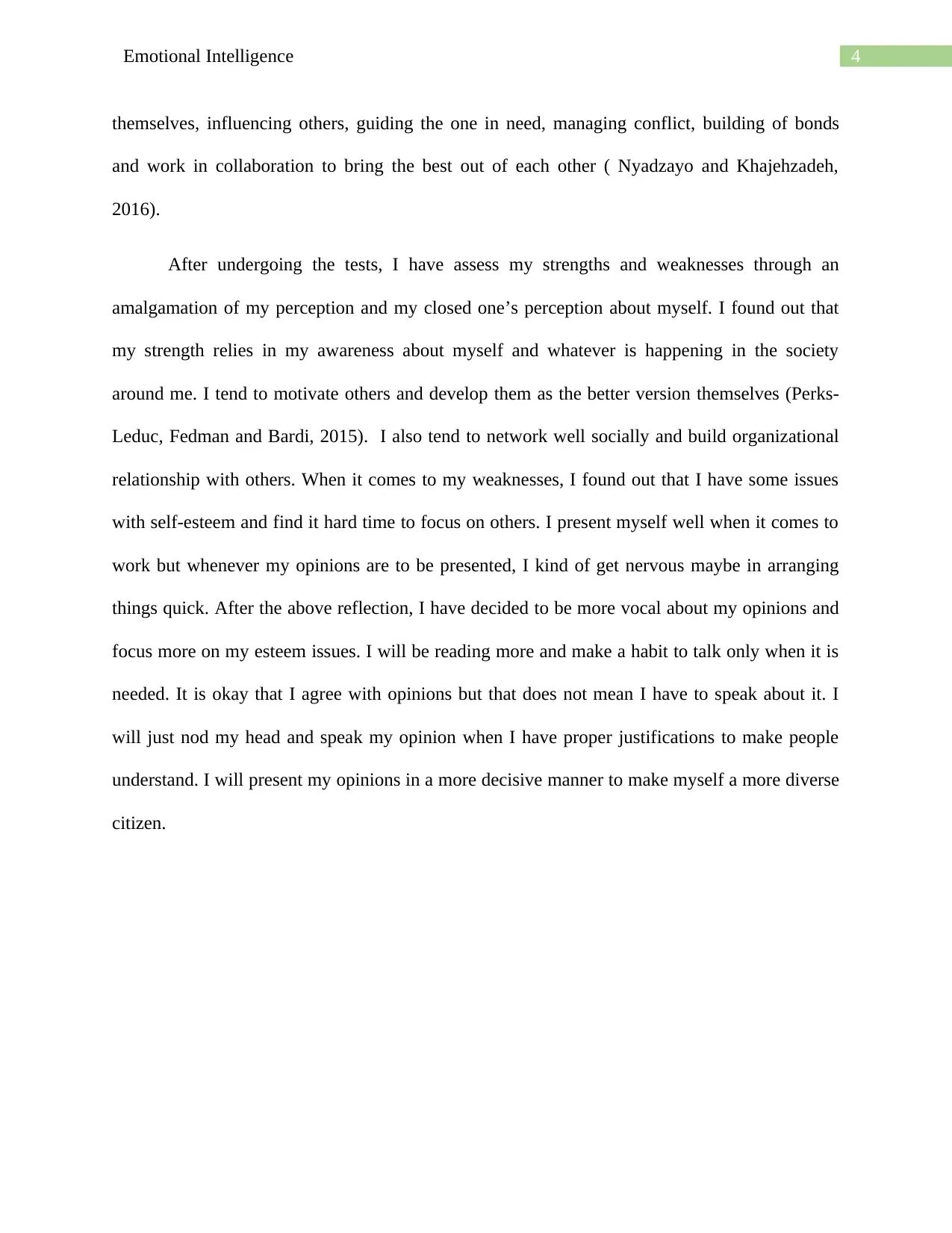
4Emotional Intelligence
themselves, influencing others, guiding the one in need, managing conflict, building of bonds
and work in collaboration to bring the best out of each other ( Nyadzayo and Khajehzadeh,
2016).
After undergoing the tests, I have assess my strengths and weaknesses through an
amalgamation of my perception and my closed one’s perception about myself. I found out that
my strength relies in my awareness about myself and whatever is happening in the society
around me. I tend to motivate others and develop them as the better version themselves (Perks-
Leduc, Fedman and Bardi, 2015). I also tend to network well socially and build organizational
relationship with others. When it comes to my weaknesses, I found out that I have some issues
with self-esteem and find it hard time to focus on others. I present myself well when it comes to
work but whenever my opinions are to be presented, I kind of get nervous maybe in arranging
things quick. After the above reflection, I have decided to be more vocal about my opinions and
focus more on my esteem issues. I will be reading more and make a habit to talk only when it is
needed. It is okay that I agree with opinions but that does not mean I have to speak about it. I
will just nod my head and speak my opinion when I have proper justifications to make people
understand. I will present my opinions in a more decisive manner to make myself a more diverse
citizen.
themselves, influencing others, guiding the one in need, managing conflict, building of bonds
and work in collaboration to bring the best out of each other ( Nyadzayo and Khajehzadeh,
2016).
After undergoing the tests, I have assess my strengths and weaknesses through an
amalgamation of my perception and my closed one’s perception about myself. I found out that
my strength relies in my awareness about myself and whatever is happening in the society
around me. I tend to motivate others and develop them as the better version themselves (Perks-
Leduc, Fedman and Bardi, 2015). I also tend to network well socially and build organizational
relationship with others. When it comes to my weaknesses, I found out that I have some issues
with self-esteem and find it hard time to focus on others. I present myself well when it comes to
work but whenever my opinions are to be presented, I kind of get nervous maybe in arranging
things quick. After the above reflection, I have decided to be more vocal about my opinions and
focus more on my esteem issues. I will be reading more and make a habit to talk only when it is
needed. It is okay that I agree with opinions but that does not mean I have to speak about it. I
will just nod my head and speak my opinion when I have proper justifications to make people
understand. I will present my opinions in a more decisive manner to make myself a more diverse
citizen.
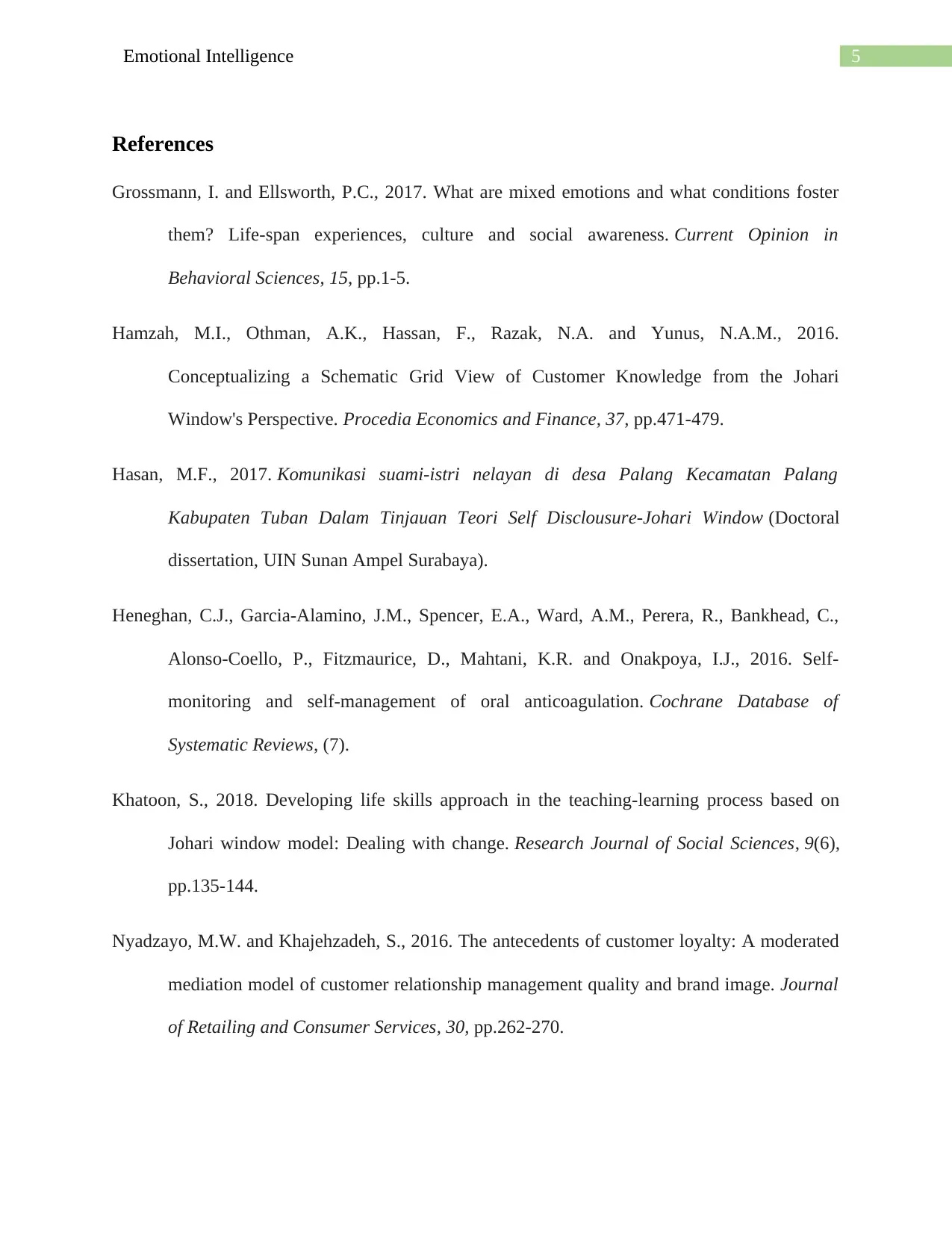
5Emotional Intelligence
References
Grossmann, I. and Ellsworth, P.C., 2017. What are mixed emotions and what conditions foster
them? Life-span experiences, culture and social awareness. Current Opinion in
Behavioral Sciences, 15, pp.1-5.
Hamzah, M.I., Othman, A.K., Hassan, F., Razak, N.A. and Yunus, N.A.M., 2016.
Conceptualizing a Schematic Grid View of Customer Knowledge from the Johari
Window's Perspective. Procedia Economics and Finance, 37, pp.471-479.
Hasan, M.F., 2017. Komunikasi suami-istri nelayan di desa Palang Kecamatan Palang
Kabupaten Tuban Dalam Tinjauan Teori Self Disclousure-Johari Window (Doctoral
dissertation, UIN Sunan Ampel Surabaya).
Heneghan, C.J., Garcia‐Alamino, J.M., Spencer, E.A., Ward, A.M., Perera, R., Bankhead, C.,
Alonso‐Coello, P., Fitzmaurice, D., Mahtani, K.R. and Onakpoya, I.J., 2016. Self‐
monitoring and self‐management of oral anticoagulation. Cochrane Database of
Systematic Reviews, (7).
Khatoon, S., 2018. Developing life skills approach in the teaching-learning process based on
Johari window model: Dealing with change. Research Journal of Social Sciences, 9(6),
pp.135-144.
Nyadzayo, M.W. and Khajehzadeh, S., 2016. The antecedents of customer loyalty: A moderated
mediation model of customer relationship management quality and brand image. Journal
of Retailing and Consumer Services, 30, pp.262-270.
References
Grossmann, I. and Ellsworth, P.C., 2017. What are mixed emotions and what conditions foster
them? Life-span experiences, culture and social awareness. Current Opinion in
Behavioral Sciences, 15, pp.1-5.
Hamzah, M.I., Othman, A.K., Hassan, F., Razak, N.A. and Yunus, N.A.M., 2016.
Conceptualizing a Schematic Grid View of Customer Knowledge from the Johari
Window's Perspective. Procedia Economics and Finance, 37, pp.471-479.
Hasan, M.F., 2017. Komunikasi suami-istri nelayan di desa Palang Kecamatan Palang
Kabupaten Tuban Dalam Tinjauan Teori Self Disclousure-Johari Window (Doctoral
dissertation, UIN Sunan Ampel Surabaya).
Heneghan, C.J., Garcia‐Alamino, J.M., Spencer, E.A., Ward, A.M., Perera, R., Bankhead, C.,
Alonso‐Coello, P., Fitzmaurice, D., Mahtani, K.R. and Onakpoya, I.J., 2016. Self‐
monitoring and self‐management of oral anticoagulation. Cochrane Database of
Systematic Reviews, (7).
Khatoon, S., 2018. Developing life skills approach in the teaching-learning process based on
Johari window model: Dealing with change. Research Journal of Social Sciences, 9(6),
pp.135-144.
Nyadzayo, M.W. and Khajehzadeh, S., 2016. The antecedents of customer loyalty: A moderated
mediation model of customer relationship management quality and brand image. Journal
of Retailing and Consumer Services, 30, pp.262-270.
⊘ This is a preview!⊘
Do you want full access?
Subscribe today to unlock all pages.

Trusted by 1+ million students worldwide
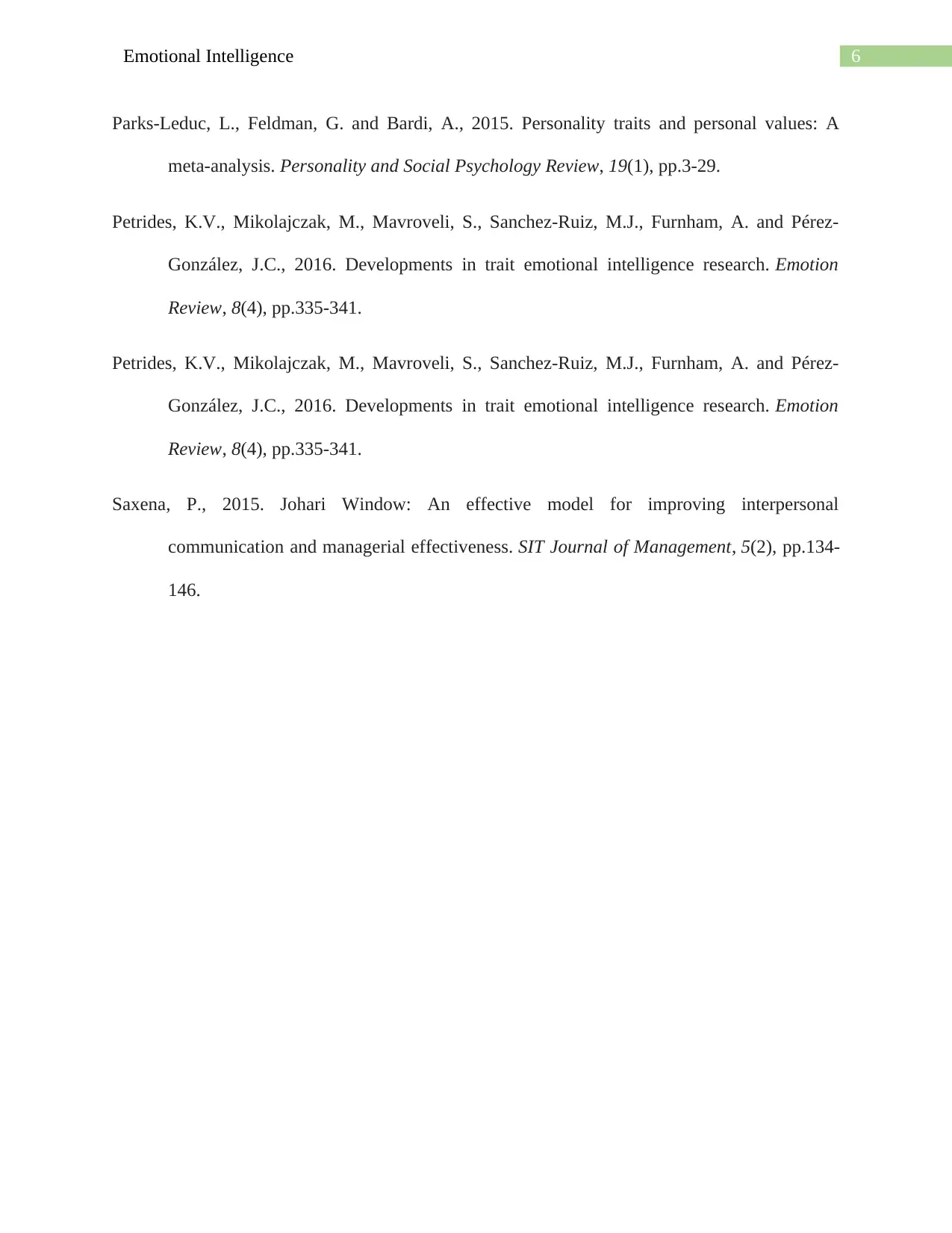
6Emotional Intelligence
Parks-Leduc, L., Feldman, G. and Bardi, A., 2015. Personality traits and personal values: A
meta-analysis. Personality and Social Psychology Review, 19(1), pp.3-29.
Petrides, K.V., Mikolajczak, M., Mavroveli, S., Sanchez-Ruiz, M.J., Furnham, A. and Pérez-
González, J.C., 2016. Developments in trait emotional intelligence research. Emotion
Review, 8(4), pp.335-341.
Petrides, K.V., Mikolajczak, M., Mavroveli, S., Sanchez-Ruiz, M.J., Furnham, A. and Pérez-
González, J.C., 2016. Developments in trait emotional intelligence research. Emotion
Review, 8(4), pp.335-341.
Saxena, P., 2015. Johari Window: An effective model for improving interpersonal
communication and managerial effectiveness. SIT Journal of Management, 5(2), pp.134-
146.
Parks-Leduc, L., Feldman, G. and Bardi, A., 2015. Personality traits and personal values: A
meta-analysis. Personality and Social Psychology Review, 19(1), pp.3-29.
Petrides, K.V., Mikolajczak, M., Mavroveli, S., Sanchez-Ruiz, M.J., Furnham, A. and Pérez-
González, J.C., 2016. Developments in trait emotional intelligence research. Emotion
Review, 8(4), pp.335-341.
Petrides, K.V., Mikolajczak, M., Mavroveli, S., Sanchez-Ruiz, M.J., Furnham, A. and Pérez-
González, J.C., 2016. Developments in trait emotional intelligence research. Emotion
Review, 8(4), pp.335-341.
Saxena, P., 2015. Johari Window: An effective model for improving interpersonal
communication and managerial effectiveness. SIT Journal of Management, 5(2), pp.134-
146.
1 out of 7
Related Documents
Your All-in-One AI-Powered Toolkit for Academic Success.
+13062052269
info@desklib.com
Available 24*7 on WhatsApp / Email
![[object Object]](/_next/static/media/star-bottom.7253800d.svg)
Unlock your academic potential
Copyright © 2020–2026 A2Z Services. All Rights Reserved. Developed and managed by ZUCOL.





